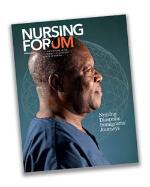Alumni Profile: Game On
April 24, 2019 Meredith Lidard KleemanStacey Brull, DNP ’12, sought to make nurse education at Mercy Medical Center not only more engaging but also — gasp! — fun.
Using games as a learning tool is nothing new (just ask any elementary school teacher), but games for adult learners aren’t nearly as common. Stacey Brull, DNP ’12, MSN, RN, NE-BC, wanted to change that and sought to make nurse education not only more engaging but also — gasp! — fun.
In her role as senior director of education research and nursing informatics at Mercy Medical Center in Baltimore, Brull noted that new nurses had a hard time engaging with the hospital’s traditional orientation methods, which included classroom lectures and PowerPoint presentations. “We had a three-day orientation, and by the end of Day One, they were zoned out,” she explains.
Brull was inspired by fellow airplane passengers who were playing games on their smartphones. “I was sitting on a flight, thinking, ‘There’s got to be a way to make education and training more fun — why don’t we start using some games?’ ”
Along with her team at Mercy, Brull tested existing game platforms that can be incorporated into professional settings, and they received positive feedback during trials. That led to the creation of a custom orientation game, which a local agency helped build in collaboration with Brull and Susan Finlayson, DNP, RN, senior vice president of operations for Mercy Medical Center.
Now, instead of sitting through traditional lectures, Mercy’s new nurses immerse themselves in the World of Salus (Latin for health care) and via an avatar, take a Journey of Care through an ancient land that experienced geological shifts, devastation, and harsh climate changes. Participants must navigate treacherous landscapes — including ancient ruins, jungle terrain, a rocky ocean coast, and a mountain range — that require the players to learn about wound, pain, and fall prevention management; infection control; evidence-based practice and research; mindfulness and transformational leadership; and clinical advancement programs and professional development.
Not only has the game elicited positive feedback from Mercy’s nursing staff, but a research study conducted by Brull and her team, published in the Journal of Nursing Administration in 2017, concluded that new nurses at Mercy retained more knowledge when learning through the game than through traditional orientation methods.
“To meet the learners’ needs, we had to change how we were training and teaching,” Brull says. “They can learn on their time, in their space, on their phones or tablets; it makes it a lot more convenient for the end user.”
New Paths for New Grads
As a nurse who is passionate about education, Heidi Chroszielewski, MSN, RN-BC, PCCN, a student in UMSON’s Doctor of Nursing Practice Post-Master’s Option, continually asks herself and those around her, “Is there a better way to do this?”
That question led Chroszielewski, a clinical nurse educator for progressive care at Mercy, to create and launch a resource nurse program as part of her DNP project. The program educates new nursing graduates to serve in float pool positions, making them available to units throughout the hospital, as needed.
At Mercy, the accepted view was that float nurses needed to be experienced, Brull explains, but Chroszielewski wondered why that was necessary. “Her being inquisitive made everyone stop and reconsider,” says Brull, who works closely with Chroszielewski on education and training projects.
Chroszielewski perceived float nurse roles as ideal for new nurses “because they’re getting all of this experience,” she explains. “Instead of coming out of school and going to one unit, they’re seeing a wide variety of things and applying what they learned.”
Photograph by Justin Tsucalas
 This article first appeared in the Spring 2019 issue of Nursing For/um magazine.
This article first appeared in the Spring 2019 issue of Nursing For/um magazine.